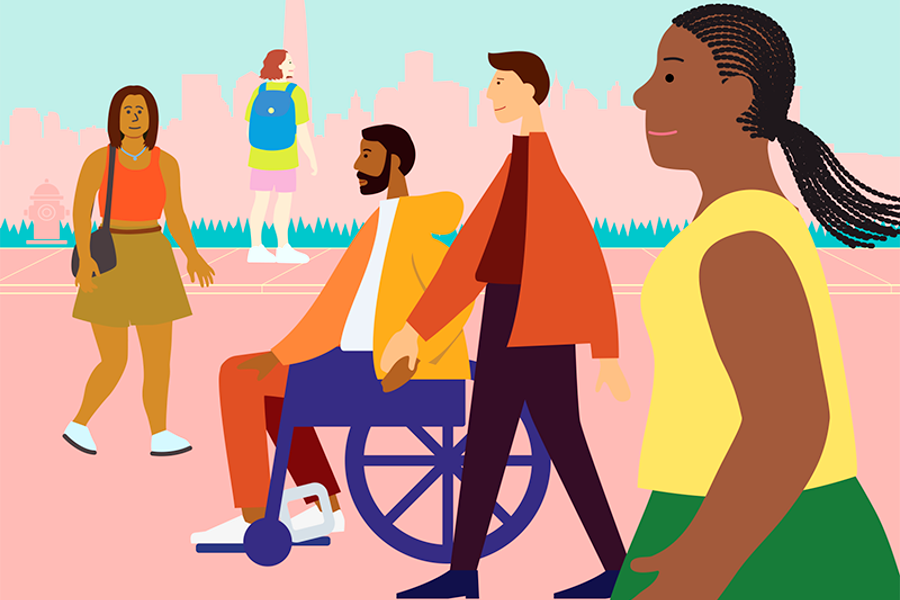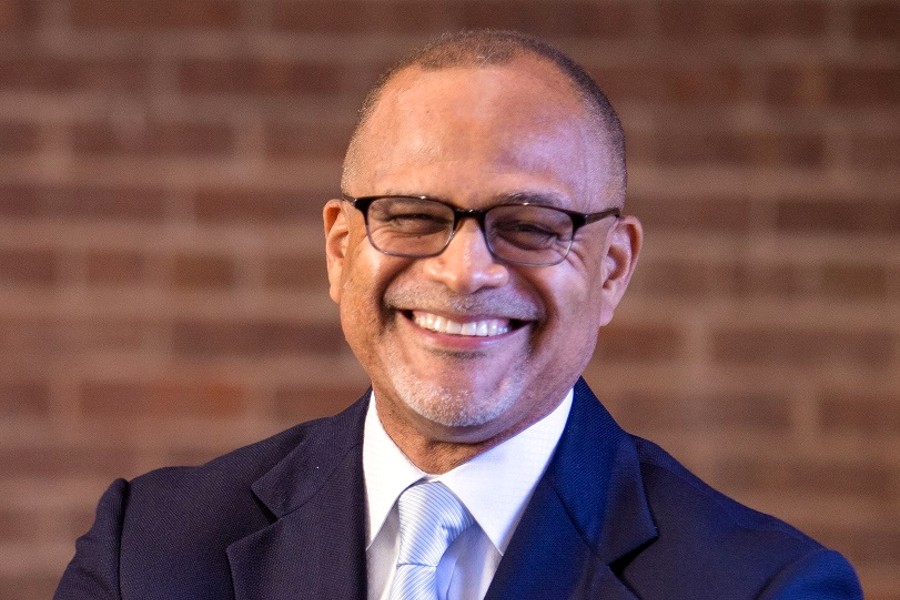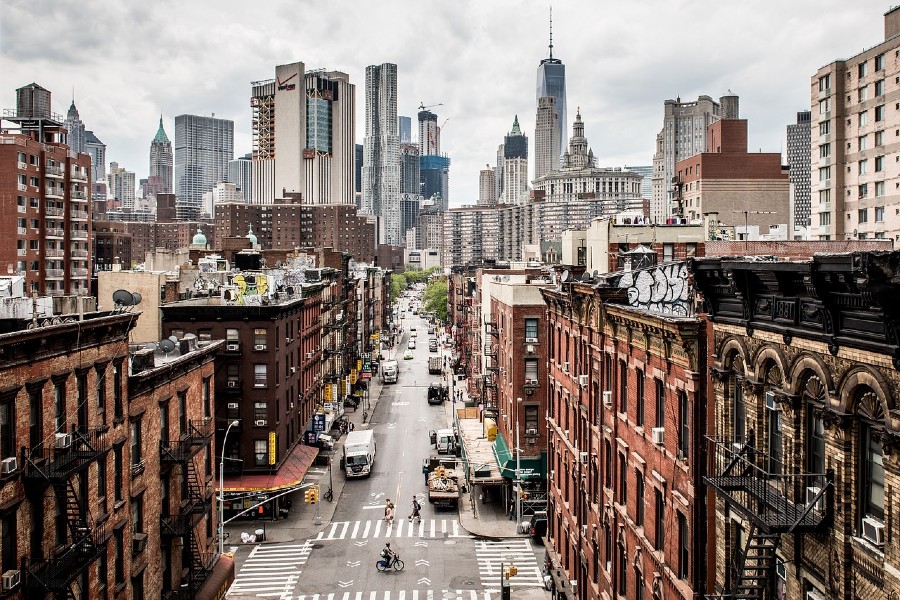
The Street Harassment Prevention Advisory Board (SHPAB), launched a citywide outreach effort to conduct a survey on the nature, prevalence, and impact of street harassment on New Yorkers.
The SHPAB is co-chaired by the New York City Mayor’s Office to End Domestic and Gender-Based Violence (ENDGBV) and the New York City Commission on Gender Equity (CGE). CGE sits within the NYC Mayor’s Office of Equity (MOE). The SHPAB was established by Local Law 46 of 2022 to study and raise awareness of street harassment and to develop resources for survivors and bystanders. This survey will help the advisory board better understand how and where New Yorkers experience street harassment, identify people and communities most at risk, and understand what kind of prevention, education, and training resources city agencies, community members, and individuals can utilize to address this form of violence.
Local Law 46 defines street harassment as unwelcome, offensive or threatening statements, gestures or other conduct directed at individuals in public places such as streets, sidewalks, parks and public transportation. Street harassment can be based on the person’s actual or perceived age, race, creed, color, national origin, gender, disability, sexual orientation or any other trait, status or condition. Street harassment can have a pronounced effect on the well-being, safety and mental health of individuals who experience it and can create environments that limit people’s ability to move freely in public spaces.
This survey marks just the beginning of the city’s work to better understand and respond to street harassment. This version of the survey is designed to gather information from people who have experienced street harassment – not people who have caused street harassment or those who have both experienced and caused street harassment. For New York City to adequately address street harassment, the city needs to compassionately engage people who cause street harassment to better understand what motivates their actions and what support and resources they need to change their behavior. The next phase of this initiative will actively engage people who cause street harassment.
“Street harassment can have significant short- and long-term consequences for people who are victimized. Fear, anxiety, and distrust prevent people from engaging in community activities and enjoying safe, public spaces,” said New York City Mayor Eric Adams. “The survey is a major tool that will give us insights on how to develop stronger, protective measures through community engagement, policies, legislation, training, or other supports to stop street harassment across New York City. People deserve to be safe in their surroundings and communities, and the SHPAB survey and resource guide are another step to make our city safer.”
How to Get Involved
New Yorkers are encouraged to take the confidential survey, whether they have experienced or witnessed harassment, or have themselves harassed others. The survey consists of multiple-choice questions about peoples’ experiences of street harassment. The SHPAB also invites New Yorkers to read and share “End Street Harassment: A NYC Resource Guide,” an accessible, practical, comprehensive document that contains important information for New Yorkers on how they can prevent and respond to street harassment both in the moment and following an incident of harassment either as a target or as a bystander. The guide is available online and includes information on how people who have been harassed by someone can file discrimination and harassment complaints, and find supportive resources including trainings, educational resources, community engagement opportunities, and tips for having conversations about the issue with friends and family. The survey will be promoted widely through city agencies and community-based networks.
In partnership with community-based organizations, ENDGBV and CGE will host a citywide “Day of Action” on September 27, 2023 to engage the community, distribute resource guides, and ask New Yorkers to take the public survey. The Day of Action will take place from 11 a.m. to 2 p.m. at five locations:
- Manhattan: Washington Square Park
- Brooklyn: Barclays Center, across the street in front of Target
- Queens: Rufus King Park
- Staten Island: Ferry Terminal
- Bronx: 149 Street Concourse (3rd Ave. – 2/5 train)
To learn more about the Day of Action or to get involved, please contact genderequity@cityhall.nyc.gov.
“Everyone, wherever they happen to be in the city, deserves to feel safe and respected,” said New York City Deputy Mayor for Health and Human Services Anne Williams-Isom. “The Street Harassment resource guide and public survey are important next steps as we all work together to create public spaces free from harassment.”
“The Street Harassment Prevention Advisory Board survey is a call to action to identify where street harassment is happening and to find solutions to protect all people from harassment,” said New York City Deputy Mayor for Strategic Initiatives Ana Almanzar. “This administration is bringing together the city government to deploy the proper resources and guides to raise awareness and create effective support services. The survey will allow us to get information directly from people in communities and enable us to get recommendations from the Street Harassment Advisory Board to create safer, protected, and more welcoming public and private spaces for the people of New York City.”
“The Street Harassment Prevention Advisory Board is providing New Yorkers with critical resources to prevent and respond to street harassment,” said New York City Mayor’s Office to End Domestic and Gender-Based Violence Commissioner and SHPAB Co-Chair Cecile Noel.“With the launch of the city’s first-of-its-kind Street Harassment Prevention Survey, we will hear directly from New Yorkers about their experiences and how we can best stand with communities against street harassment.”
“Everyone deserves to feel safe and respected in our city’s public spaces. The SHPAB survey and resources are crucial tools in raising awareness, supporting communities, and providing us with the insights we need to take action,” said the New York City Mayor’s Office of Equity Commissioner and SHPAB Co-Chair Sideya Sherman. “Learnings from the survey will help the city develop effective training, programs, policies, campaigns, and other measures that will foster welcoming public spaces for all.”
“The Street Harassment Prevention Advisory Board is invested in the safety and well-being of all New Yorkers,” said New York City Commission on Human Rights Acting Chief of Staff Jose Rios Lua. “The Commission is dedicated to ensuring that all New Yorkers can live, work, and thrive free from discrimination. Walking our diverse streets should be one of the joys of living in New York City and no one should be made to feel unsafe to do so. Understanding how New Yorkers experience street harassment is crucial to preventing and eliminating these kinds of violations of the city’s robust Human Rights Law, and this survey a key step in that direction.”
“Everyone deserves to feel welcome in our public spaces, especially people of marginalized identities who are often the target of street harassment,” said New York City Department of Transportation Chief Strategy Officer Julie Bero. “This resource guide provides valuable tools for addressing this violence, including bystander intervention techniques and tools to build safe and inviting public spaces in our communities. I encourage all New Yorkers to complete this survey and help us stop street harassment in its tracks.”
“New Yorkers everywhere deserve to feel safe at all hours of the day – including and especially those who work in or patronize our city’s world-class 24/7 nightlife,” said Deputy Director at the NYC Office of Nightlife at the Mayor’s Office of Media and Entertainment Jose Soegaard. “The Street Harassment Prevention Advisory Board’s new first-of-its-kind survey will help us build better policies that keep New York City streets free from harassment at any hour of the day.”
“Street harassment erodes the sense of security that everyone should feel in public spaces, especially for young girls, women and the queer community,” said Director of Policy of Girls for Gender Equity Quadira Coles. “Any and all forms of harassment perpetuate harmful power dynamics, reinforce stereotypes and damaging narratives about gender, identity and status, and can sometimes escalate into more severe forms of violence. It is important for us to understand what kinds of harassment New Yorkers are experiencing in order to move towards a solution to ensure a more safe and inclusive community.”
“New York City has been on the cutting-edge of citywide solutions to street harassment since their first city council hearing in 2010,” said Mayoral Appointee and President and Co-Founder of Right to Be Emily May. “The Mayor’s Street Harassment Prevention Advisory Board is the city’s latest step in that journey and is working hard to flood the city’s agencies and people with much-needed resources to meaningfully combat street harassment without increasing criminalization. I’m honored to serve as an advisory board member.”
“Voces Latinas applauds the NYC Mayors Office for their work on ending street harassment in the streets of NYC. As a community-based agency in Jackson Heights, Queens, we represent the immigrant Latine* voice. It is important for us to ensure our community knows about resources and services that protect them and their rights,” said CEO of Voces Latinas Nathaly Rubio-Torio. “The Street Harassment Guide, available in Spanish, is one of those resources every new immigrant needs to have. We thank the Mayor and his administration for taking this issue seriously, listening to survivors’ experience, and responding to this issue that is long overdue.“
“The underlying message of the resource guide and the impetus for the survey is simple: Street harassment does not have to be a fact of life in New York City,” said Jean Son, Advisory Board Member and Community Advocate. “But it requires a team effort by New Yorkers to equip ourselves with the tools to respond to harassment effectively, and to share our stories so we can gain a fuller understanding of the problem. I’m proud of our city for being one of the first to recognize and engage with this work.”
“Everyone has the right to walk the street without fear, to navigate public spaces without experiencing cat-calling and intimidation, and to live free from the shadow of harassment,” said Program Manager of the RISE Project at the Center for Court Innovation Natalie Arzu. “Proactive bystanders are essential in creating a culture where everyone takes a stand against street harassment, by challenging norms, supporting survivors and ensuring public spaces are respectful and safe for all.”
About the Street Harassment Prevention Advisory Board
The Street Harassment Prevention Advisory Board (SHPAB), co-chaired by the NYC Mayor’s Office to End Domestic and Gender-Based Violence (ENDGBV) and the NYC Commission on Gender Equity (CGE), was instituted by Local Law 46 of 2022 and is made up of members from the City Commission on Human Rights, Office of Nightlife, the Department of Transportation, and mayoral, public advocate, and city council speaker appointees. The SHPAB advises the mayor and city council on legislation and programming, training and educational materials to promote public awareness and prevention, support and resources for victims, filing discrimination and harassment complaints, and non-criminal responses to street harassment.
Organizations that played a large role in the creation of the Board, include Asian American Federation, Bowen Public Affairs Consulting, Center for Anti-Violence Education, Girls for Gender Equity, Make the Road – TGNCIQ Justice Project, MinKwon Center, Right to Be, Translatinx Network, Transgender Equity Consulting, VIP Mujeres, and Voces Latinas.
Mayor’s Office to End Domestic and Gender-Based Violence
The Mayor’s Office to End Domestic and Gender-Based Violence (ENDGBV) develops policies and programs, provides training and prevention education, conducts research and evaluations, performs community outreach, and operates the New York City Family Justice Centers. We collaborate with City agencies and community stakeholders to ensure access to inclusive services for survivors of domestic and gender-based violence (GBV). GBV includes intimate partner violence, family violence, elder abuse, sexual violence (which can include sexual harassment), stalking, and human trafficking. Read more about the term.
The NYC Family Justice Centers are co‐located multidisciplinary service centers providing vital social services, civil legal, and criminal justice assistance for survivors of domestic and gender-based violence and their children—all under one roof. For more information, visit nyc.gov/ENDGBV .
NYC Commission on Gender Equity
Founded in 2015, the NYC Commission on Gender Equity (CGE) works to create a deep and lasting institutional commitment to tearing down equity barriers across New York City. CGE addresses issues of inequity and discrimination facing girls, women, intersex, transgender and gender non-binary and gender non-conforming persons regardless of age, disability, ethnicity/race, faith, gender expression, immigrant status, sexual orientation, and socioeconomic status. Focusing across the areas of economic mobility and opportunity, health and reproductive justice, and safety CGE ensures that the city leads in the development and implementation of best practices in gender equitable policies and programs for its workforce and its residents. For more information, visit nyc.gov/GenderEquity .
Mayor’s Office of Equity
Launched in Spring 2022, the Mayor’s Office of Equity helps foster a fairer, more equitable city through policy, practices, and programs across all city agencies and systems. As the city’s first, centralized equity office, the Office of Equity is an integral component of Mayor Adam’s vision to build a stronger and healthier city that delivers for all New Yorkers. The Office of Equity utilizes an intersectional approach to equity and includes the Commission on Gender Equity (CGE), the former Racial Justice Commission (RJC), the Pay Equity Cabinet (PEC), the Unity Project (UP), the Young Men’s Initiative (YMI) and the Taskforce on Racial Inclusion & Equity (TRIE). Together, this body of offices and commissions engage New York’s diverse communities and constituencies to create transformative change.
Photo credit: NYC.gov.
- Wells Fargo Shares Economic Impact From Open For Business Fund
- Harlem Rallies For Kamala Harris: A Historic Gathering Of Black Women Leaders
- In Conversation With Ketanji Brown Jackson At The Apollo Theater In Harlem
- Chancellor David C. Banks Appoints Simone Hawkins As Deputy Chancellor For Early Education
- Vibrant Summer Styles Are Making A Comeback 2024
Become a Harlem Insider!
By submitting this form, you are consenting to receive marketing emails from: Harlem World Magazine, 2521 1/2 west 42nd street, Los Angeles, CA, 90008, https://www.harlemworldmagazine.com. You can revoke your consent to receive emails at any time by using the SafeUnsubscribe® link, found at the bottom of every email. Emails are serviced by Constant Contact








